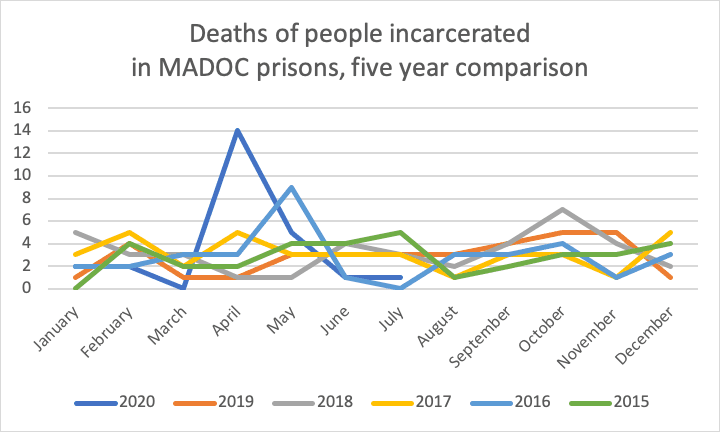See update published on September 8, 2020.
In April 2020, more people died while incarcerated by the Massachusetts Department of Correction (MADOC) than in any month over the past five years. On average, between 2015 and July 2020, 3.1 people died per month in MADOC prisons. Before this year, the highest number of deaths in a single month was nine, in May 2016.
In April 2020, fourteen people died in Massachusetts state prisons.
This data comes from MADOC. In early August, I filed a request regarding the number of people who died while incarcerated within Massachusetts prisons 2015 – 2020 (through July), under the Massachusetts Public Records Law (Law), Chapter 66, Section 10 of the Massachusetts General Laws. The data I received from the MADOC provides new insights into the impact of COVID-19 on incarcerated people.
Chart 1.1

May 2020 is also comparatively high, with five deaths; however, each year 2015 – 2019 included at least one month with five or more deaths.
The data includes the cause of death for seven of the 20 people who died between January and July 17, 2020. Of those, four are documented as related to COVID, all in April. The deaths in April occurred at six separate prisons (Table 1.1), and the average age of those who died was 72 (ages ranged from 57 to 87).
Table 1.1 Deaths in MA DOC prisons in April 2020
| Prison | Number Died in April 2020 | Reported Cause of Death |
| Mass Treatment Center | 5 | 3-COVID 2-Not specified |
| MCI- Norfolk | 2 | Not specified |
| MCI-Shirley | 4 | 1-COVID 3-Not Specified |
| MCI-Framingham | 1 | Not Specified |
| Souza Baranowski Correction Center | 1 | ‘Hanging’ |
| Old Colony Correctional Center | 1 | Not Specified |
Because of an April 3, 2020 decision by the Massachusetts Supreme Judicial Court on a case brought by the Committee for Public Counsel Services, the MADOC and state counties were mandated to release numbers related to testing and the number of people who tested positive in prisons and jails. The decision did not address deaths. Nonetheless, journalists have reported on deaths, uncovering at least part of the picture. [i]
Table 1.2 Deaths in MA DOC prisons in April, previously made public through media reports
| Prison | Number of deaths | Reported Cause of Death |
| MTC Bridgewater | 5 | COVID |
| MCI Shirley | 2 | COVID |
But how we do explain the other seven deaths of incarcerated people? Three possible explanations arise:
- Coincidence: Seven people died of COVID and another seven died of ‘natural causes.’
This explanation is extremely unlikely. The probability of 7 people dying in a single month is low (3.3%); and, including the known COVID-related deaths, the probability of 14 people dying in a single month is negligible (0.2%).[ii] At a minimum, as a matter of protection of human rights and public health, it would be reckless for anyone with responsibility for oversight of the prison system to accept this explanation without an investigation. Seven deaths in a single month is already high: over the past five years, it was only matched in October 2018, and only surpassed in May 2016 (nine deaths).
- More incarcerated people died due to COVID-19-related causes than was previously publicly known;
- The prisons’ responses to COVID-19 shifted priorities behind walls to the detriment of other health issues, directly contributing to increases of non-COVID-19 related deaths. This may include the profound psychological impacts of maintaining people in conditions of lockdown, which, for many of the nearly 6,000 people incarcerated in Massachusetts’ prisons, approximates solitary confinement.
Explanations number two and three are more likely and demand immediate, urgent investigation. COVID is far from behind us, and people inside prisons are at heightened risk and have very little capacity to protect themselves from a virus.
Not enough information is currently publicly available to
answer the question: why did so many in incarcerated people died in April 2020?
There is certainly enough evidence to demand an investigation and official explanation.
[i] Examples of reporting on deaths: Jenifer McKim, “First Massachusetts Inamte Dies from COVID-19,” WGBH, April 2, 2020, Available at: https://www.wgbh.org/news/local-news/2020/04/02/coronavirus-infections-continue-to-rise-in-massachusetts-prisons; Arianna MacNeil, “Third Mass. Inmate with COVID-19 dies; stricter social distancing to be enforced at all facilities,” Boston.com, April 5, 2020. Available at: https://www.wgbh.org/news/local-news/2020/04/02/coronavirus-infections-continue-to-rise-in-massachusetts-prisons. Deborah Becker, “Massachusetts DOC reports a 4th COVID 19 prisoner death at Massachusetts Treatment Center in Bridgewater,” via Twitter, April 13, 2020, 5:23 p.m. Available at: https://twitter.com/wburdebbecker/status/1249810376465813504; Deborah Becker, “5 Mass. Prisoners Die Due to COVID-19,” WBUR, April 16, 2020. Available at: https://www.wbur.org/news/2020/04/16/coronavirus-deaths-jails-prisons-update; Deborah Becker, “Coronavirus Infections Double Among prisoners at MCI-Shirley,” WBUR, April 28, 2020. Available at: https://www.wbur.org/commonhealth/2020/04/28/shirley-prison-coronavirus-infections.
[ii] Thank you to Matthew Siegel for help with the statistics.



